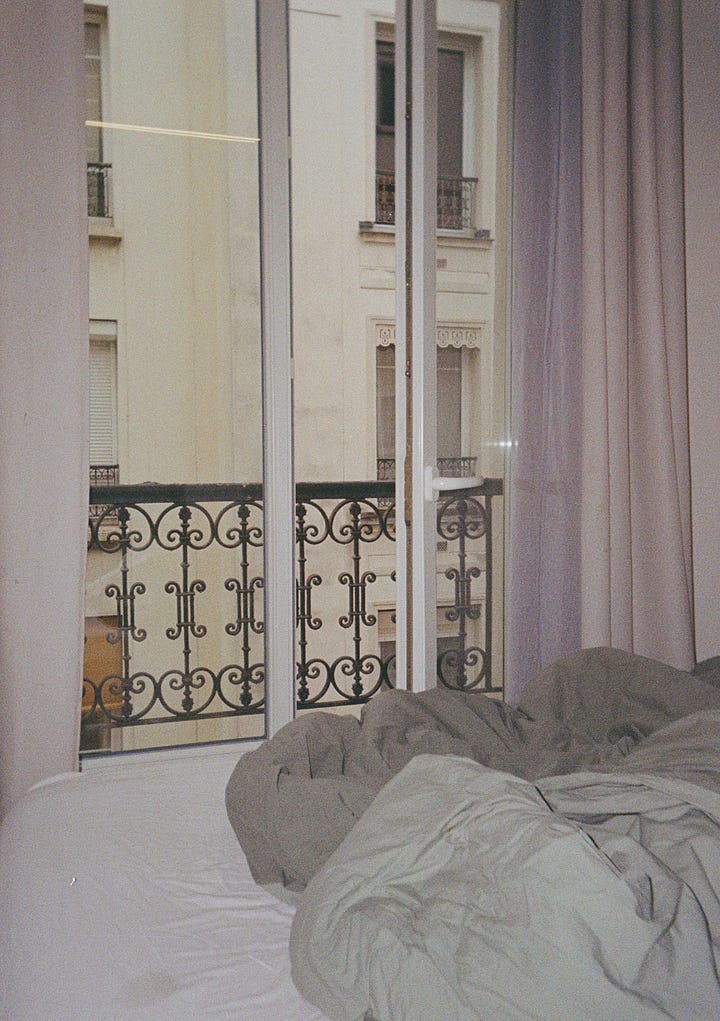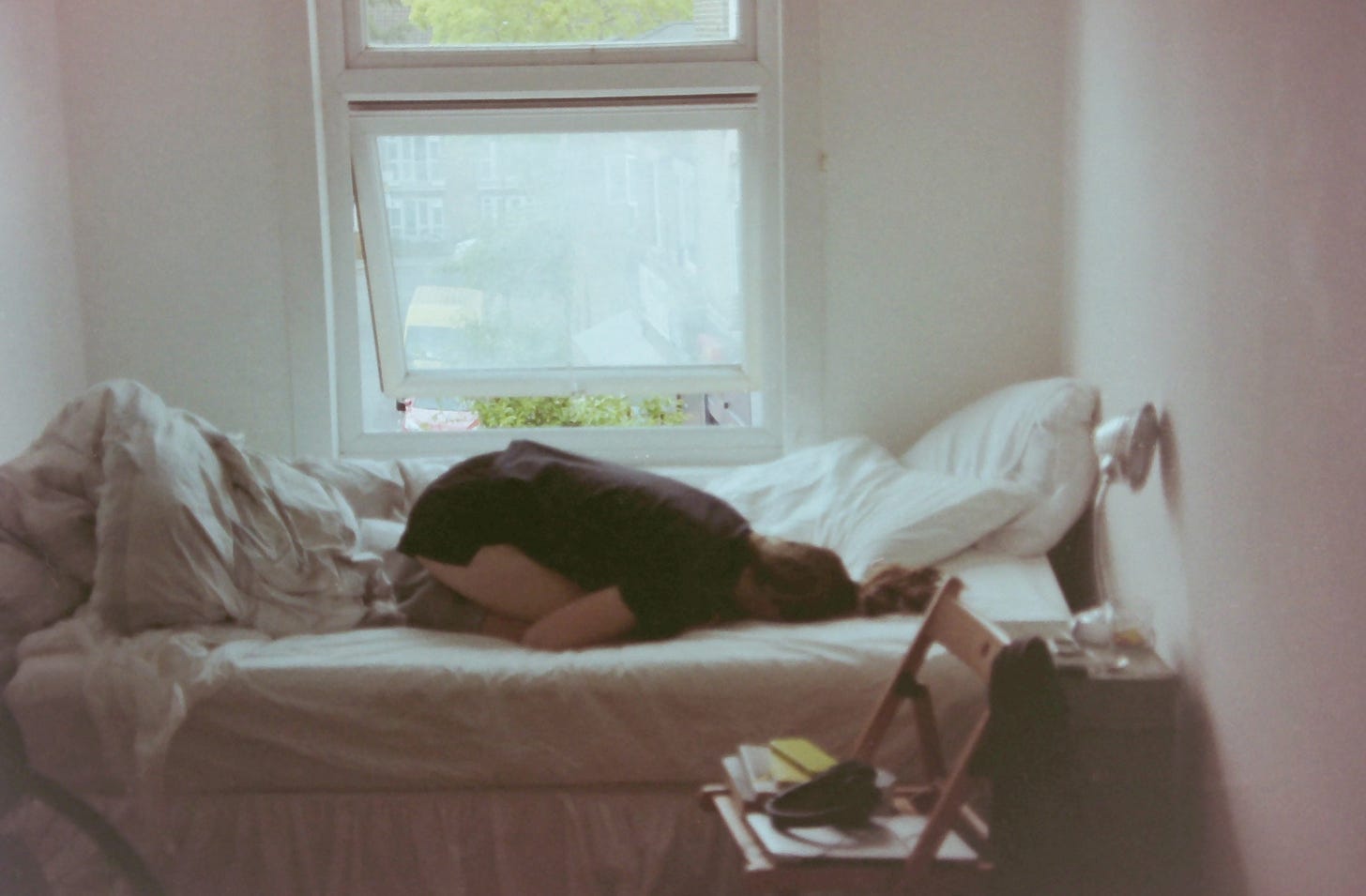I should never have mentioned Paris. That was my mistake. People have ideas about Paris. You can’t read Proust without being accused of snobbery. You can’t pronounce French foods with a French accent. People act like there’s an aptitude test just to get on the plane, like the great tide of globalism has left Paris untouched, preserved, a pioneer village, everyone drinking cider and singing songs and shitting in the gutters.
Maybe it’s the architecture that fuels the fantasy: those gloriously unbombed Haussmann blocks. Maybe it’s the tailoring. The pastries? Really, I think we just want to believe that there’s still a place immune to digitization and gigwork, a place free of modern horrors: animated advertisements spewing light onto cobblestone streets, rideshare bikes zipping through crowds of tourists, shortform video platforms, contoured makeup, poly-blend fast fashion. But let me tell you, if such a place does exist, it’s not Paris.
I lived in Paris once, just for a few months, until my visa ran out. All the expected things happened: I bought a long navy coat, felt ashamed of my nationality, had a love affair with a non-committal Frenchman, and contracted gout. Yes! The doctors didn’t think it was possible until I came limping into the hospital, my big toes aflame. How romantic—here was the Old Paris I’d come looking for.
It wasn’t just the gout. I was sick all over. If anything, the gout was a welcome distraction from the Big Diagnosis. I’d been thinking about the Big Diagnosis constantly, trying to work out which aspect was worse: the idea or the experience; the pain or the terror; the present distress or future decline. I swear to god, when I turned my neck it sounded like gravel.
The Big Diagnosis came just before I moved to Paris. I was 23 and living in my hometown when my hands started to ache. I went to the doctor. He said I was working too hard. I am never working too hard. In fact, I hadn’t worked in weeks: my hands wouldn’t let me. He prescribed muscle relaxants, which sounded like something you’d take at a fraternity initiation. I was afraid to relax. Something was wrong. I didn’t pick up the prescription.
Finally, I convinced him to give me an x-ray. The news was bad, and I received it alone. A disc missing, vertebrae grinding together, bone density declining. Life is short, I thought. Life is over. I should move to Paris.


I arrived a month later and tried my best to integrate. I suffered romantic disappointments, bought romantic clothes, contracted romantic maladies, and all the while my spine cried out from beneath its skin-blanket: You will never know happiness.
For a long time, my spine was right. Though I appeared to live on, to experience new things, none of it was real in the way my pain was real. I couldn’t sleep. I couldn’t draw. I quit illustration. I didn’t know who I was anymore. Compulsively, I told everyone about my pain. I put it in my dating profile. The one thing you should know about me: I have a degenerative spinal disease. I couldn’t chop vegetables. I couldn’t brush my own hair. The doctor offered opiates. I said no. I began researching assisted suicide. I watched a documentary in which people drank poison and died. Finally, I thought, something to look forward to.
But not yet! I told myself to hang on for at least another decade. If I was still in this much pain in a decade, then I was allowed to fly to Switzerland. I made a plan for my remaining time. I would write three books in 10 years. It was strange how quickly this idea arrived in my head. I was not a writer. I was not even a reader. But I was spending a lot of time in bed. Writing could be performed supine. Just look at Proust, inveterate invalid. Writing would be my legacy, my excuse, something to point to should anyone suggest I go on living. I’ve written my books, I would say. Now let me die.
I sold my first book at 25. Once that was finished, I started writing stories. I wrote a bad novel, then I wrote a better novel. I sent it around. I got an agent. I got another book deal. I read more books. I wrote stories and published them and met writers and gave readings and found an audience. A lot of other things happened too, bad things and good things, grief and heartbreak, sex and friendship, foreign visas, dozens of apartments, anorexia and insomnia and recovery. My hair grew long, my thighs thick. I stopped using a smartphone.
I also stopped telling people about my spine. The telling, I realized, wasn’t helping. It just produced the same exchange over and over. It hurts / I’m sorry. Boring! Furthermore, damaging! The more I talked about my pain, the more I thought about it, and the more I felt it. So I found other things to talk about. Sure, I stayed sick, stayed scared, stayed in the cycle of MRIs and bone density scans and physiotherapy and test results, stayed on the path of decline. But this was no longer my identity.
Avoiding the subject was as close as I could get to health. Of course, I knew the difference. Did other people? It didn’t really matter. I was sick and happy. My readers were ignorant. I liked myself through their eyes.
Then I made the mistake of mentioning Paris. “#EverydayAbleism,” the comment read. There were many, many more. “You’re healthy,” they accused. “So privileged.” Apparently, moving abroad was the exclusive domain of the able-bodied. To even discuss doing so demonstrated ignorance of human suffering.
I found the whole phenomenon curious. Setting aside the innacuracy of the comments, I wasn’t sure what was expected of me. How should I go about addressing my privilege? I came up with four options:
Acknowledge privilege in writing, i.e. “I am moving to a foreign city—something I can only do because I am able-bodied.”
Avoid privileged actions, in solidarity with those less privileged, i.e. don’t move to Paris.
Avoid discussing privileged actions, i.e. move to Paris but don’t write about it.
Invoke another struggle, i.e. move to Paris, write about it, but make it a queer narrative.
Of course, these are all bad ideas. Imagining an easy life is a bad idea. There is no easy. We all suffer, most of us in secret. A few of us can call ourselves disabled. Isn’t that a privilege? Pity the healthy. They have no title for their pain.






"Pity the healthy. They have no title for their pain." love this!
Damn. I recently started following you because I'm interested in giving up my smartphone. I had NO IDEA you were living with an invisible illness. I'm also a young disabled person, and this post means so much to me. Thank you for so elegantly verbalizing the struggle of making decisions around self disclosure.